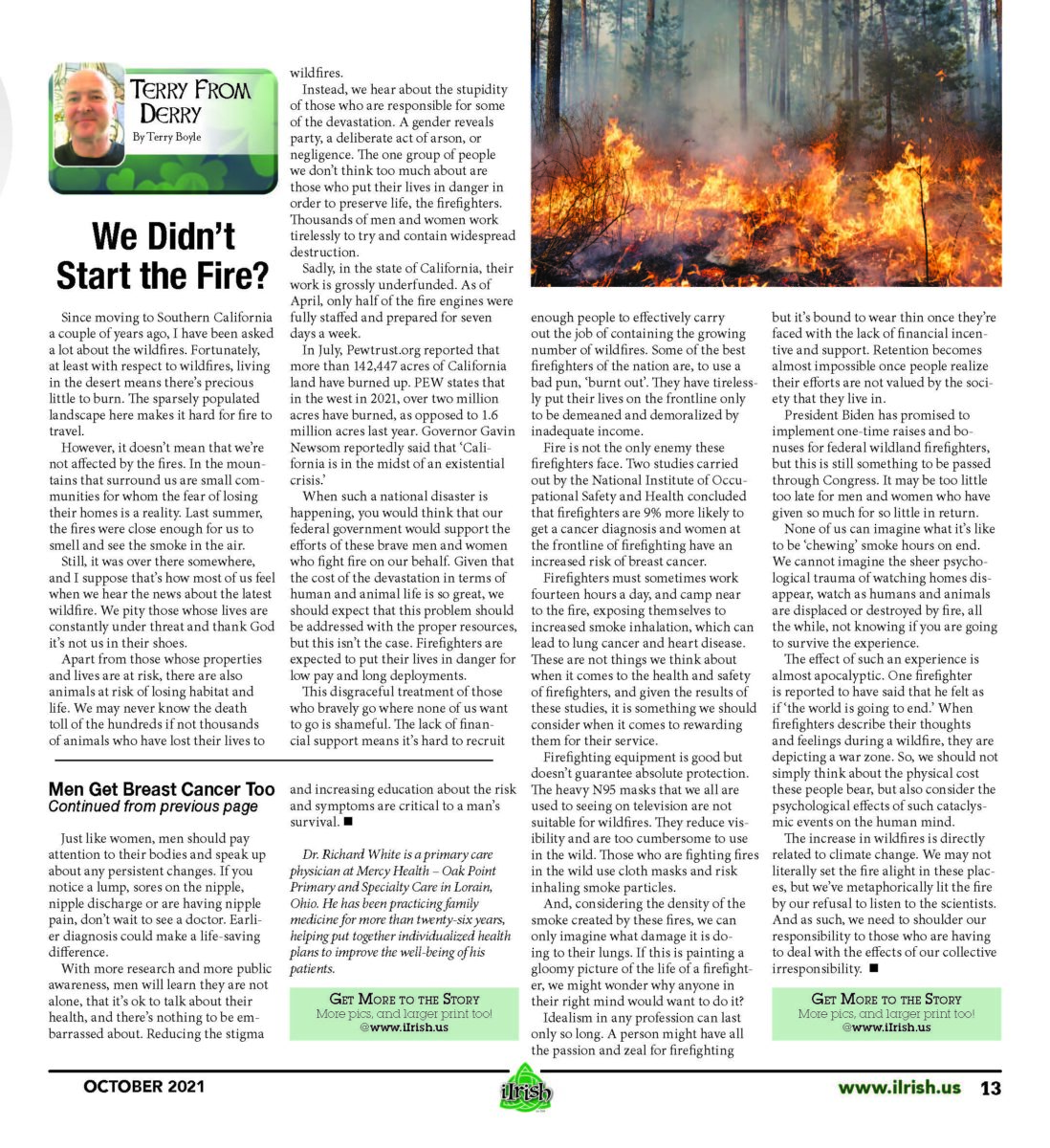

Terry from Derry: We Didn’t Start the Fire?
By Terry Boyle
Since moving to Southern California a couple of years ago, I have been asked a lot about the wildfires. Fortunately, at least with respect to wildfires, living in the desert means there’s precious little to burn. The sparsely populated landscape here makes it hard for fire to travel.
However, it doesn’t mean that we’re not affected by the fires. In the mountains that surround us are small communities for whom the fear of losing their homes is a reality. Last summer, the fires were close enough for us to smell and see the smoke in the air.
Still, it was over there somewhere, and I suppose that’s how most of us feel when we hear the news about the latest wildfire. We pity those whose lives are constantly under threat and thank God it’s not us in their shoes.
Apart from those whose properties and lives are at risk, there are also animals at risk of losing habitat and life. We may never know the death toll of the hundreds if not thousands of animals who have lost their lives to wildfires.
Instead, we hear about the stupidity of those who are responsible for some of the devastation. A gender reveals party, a deliberate act of arson, or negligence. The one group of people we don’t think too much about are those who put their lives in danger in order to preserve life, the firefighters. Thousands of men and women work tirelessly to try and contain widespread destruction.
Sadly, in the state of California, their work is grossly underfunded. As of April, only half of the fire engines were fully staffed and prepared for seven days a week.
In July, Pewtrust.org reported that more than 142,447 acres of California land have burned up. PEW states that in the west in 2021, over two million acres have burned, as opposed to 1.6 million acres last year. Governor Gavin Newsom reportedly said that ‘California is in the midst of an existential crisis.’
When such a national disaster is happening, you would think that our federal government would support the efforts of these brave men and women who fight fire on our behalf. Given that the cost of the devastation in terms of human and animal life is so great, we should expect that this problem should be addressed with the proper resources, but this isn’t the case. Firefighters are expected to put their lives in danger for low pay and long deployments.
This disgraceful treatment of those who bravely go where none of us want to go is shameful. The lack of financial support means it’s hard to recruit enough people to effectively carry out the job of containing the growing number of wildfires. Some of the best firefighters of the nation are, to use a bad pun, ‘burnt out’. They have tirelessly put their lives on the frontline only to be demeaned and demoralized by inadequate income.
Fire is not the only enemy these firefighters face. Two studies carried out by the National Institute of Occupational Safety and Health concluded that firefighters are 9% more likely to get a cancer diagnosis and women at the frontline of firefighting have an increased risk of breast cancer.
Firefighters must sometimes work fourteen hours a day, and camp near to the fire, exposing themselves to increased smoke inhalation, which can lead to lung cancer and heart disease. These are not things we think about when it comes to the health and safety of firefighters, and given the results of these studies, it is something we should consider when it comes to rewarding them for their service.
Firefighting equipment is good but doesn’t guarantee absolute protection. The heavy N95 masks that we all are used to seeing on television are not suitable for wildfires. They reduce visibility and are too cumbersome to use in the wild. Those who are fighting fires in the wild use cloth masks and risk inhaling smoke particles.
And, considering the density of the smoke created by these fires, we can only imagine what damage it is doing to their lungs. If this is painting a gloomy picture of the life of a firefighter, we might wonder why anyone in their right mind would want to do it?
Idealism in any profession can last only so long. A person might have all the passion and zeal for firefighting but it’s bound to wear thin once they’re faced with the lack of financial incentive and support. Retention becomes almost impossible once people realize their efforts are not valued by the society that they live in.
President Biden has promised to implement one-time raises and bonuses for federal wildland firefighters, but this is still something to be passed through Congress. It may be too little too late for men and women who have given so much for so little in return.
None of us can imagine what it’s like to be ‘chewing’ smoke hours on end. We cannot imagine the sheer psychological trauma of watching homes disappear, watch as humans and animals are displaced or destroyed by fire, all the while, not knowing if you are going to survive the experience.
The effect of such an experience is almost apocalyptic. One firefighter is reported to have said that he felt as if ‘the world is going to end.’ When firefighters describe their thoughts and feelings during a wildfire, they are depicting a war zone. So, we should not simply think about the physical cost these people bear, but also consider the psychological effects of such cataclysmic events on the human mind.
The increase in wildfires is directly related to climate change. We may not literally set the fire alight in these places, but we’ve metaphorically lit the fire by our refusal to listen to the scientists. And as such, we need to shoulder our responsibility to those who are having to deal with the effects of our collective irresponsibility.


Monthly newsmagazine serving people of Irish descent from Cleveland to Clearwater. We cover the movers, shakers & music makers each and every month.
Since our 2006 inception, iIrish has donated more than $376,000 to local and national charities.
GET UPDATES ON THE SERIOUS & THE SHENANIGANS!